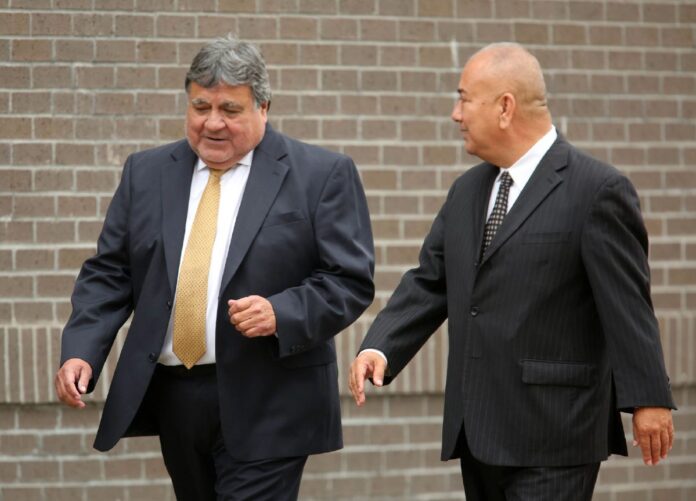Last Friday, as another inmate died of COVID-19 at a bureau of prisons facility, counsel for a former state judge convicted on bribery charges, expressed “shock,” at the government’s response to his client’s request for compassionate release from prison, records show.
In a 27-page filing May 9, counsel for ex-state District Judge Rodolfo “Rudy” Delgado replied to the government’s response, filed May 6, expressing “shock” that the government’s prosecutors would infer that his client had “subversive intent” in requesting compassionate release due to serious medical issues.
“… The Government proposes in its Response that there exists a criminal, subversive intent by Mr. Delgado to ‘hide behind’ his serious medical conditions in order to escape punishment,” the document stated, referring specifically to federal prosecutors’ response stating that Delgado’s “age and medical conditions never got in the way of him committing his crimes, and they should not be something he can hide behind now to avoid the consequences of his actions.”
The government also made a statement about Delgado’s lack of care for his own health in the past, citing his continued use of alcohol even after receiving a new liver years ago, the May 6 filing stated.
“The defendant has also shown a disregard for his own health over the years, most specifically by continuing to drink alcohol heavily even after he was somehow able to procure a liver transplant for himself. The evidence does not support that the defendant would suddenly start to follow medical advice to avoid contracting COVID-19 if he were granted the relief he seeks. For these reasons there would be no meaningful mitigation of the risk the defendant faces regarding COVID-19 were he to be released,” the government argued in the filing.
Delgado’s attorney opted to not respond to that argument.
“Undersigned counsel is perplexed at even how to respond to the suggestion stooped to by Government counsel. But, as one scholar has properly placed the issue, ‘when they go low, we go high,’” the filing stated.
In that same government filing, prosecutors for the government made several arguments against Delgado’s request for compassionate release.
Delgado, who was convicted by a federal jury of bribery in July 2019, did not, among other things, the governments stated, exhaust all of his administrative obligations in order to qualify for the compassionate release.
The government also stated the facility at which Delgado is confined was specifically chosen for Delgado due to the medical issues he suffers from; additionally, Delgado has only served a few months of a 60-month prison sentence, which he began in earnest near the end of November 2019.
Another argument made by the government in the May 6 filing was that compassionate release, or home confinement, would not avoid the spread of COVID-19 as Delgado has shown a lack of care for his own health in the past.
The government’s response states that although Delgado made his request to his case manager on April 1, he was actually required to advise the prison’s warden to begin the administrative process of asking for the compassionate release.
“This Court cannot grant judicial relief until, as the statute provides, the warden either denies the request or 30 days have passed since the warden of FMC Fort Worth received the defendant’s request, whichever is earlier. Because the defendant has not yet exhausted his administrative remedies as required by law, this Court should dismiss his motion,” the court records state.
In counsel’s reply, a timeline of Delgado’s initial request for home confinement, compassionate release, is presented.
It shows Delgado made his formal request for release April 27, and how the officials at the prison conveyed to Delgado on May 5 that his request was denied due to not having served at least 50% of his sentence.
As he did in his original request for compassionate release, counsel for Delgado underscored the unprecedented circumstances created by COVID-19, and his client’s serious medical issues, coupled with the facility’s lack of ability to protect Delgado from others in close proximity, warrant a release to home confinement for a period determined by the court.
“Again, it is not so much an issue of whether Mr. Delgado will contract the virus, but rather the probable devastating consequence that will fall upon him given the number of CDC risk factors and the inability of the prison to adequately treat the infection once contracted. Mr. Delgado seeks relief from this Court because FMC Fort Worth has confirmed it will not,” the document stated. “He is not seeking freedom, but rather a modification of his sentence which could include home confinement for any time period this Court deems appropriate and other conditions, to include continuation of participation in programs to address his alcohol dependency.”
A court’s decision on Delgado’s request is pending, records show.




